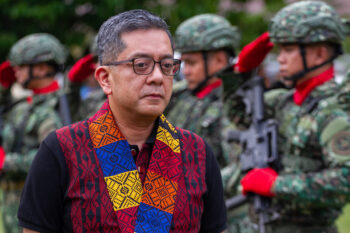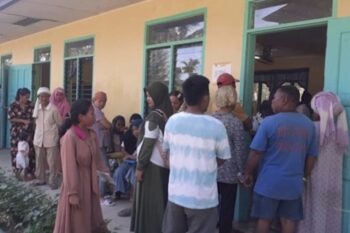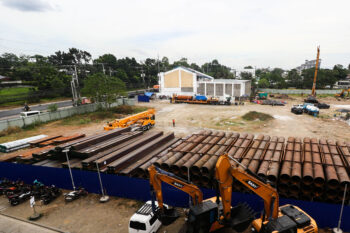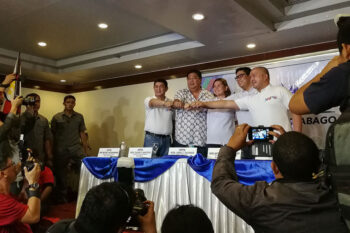3rd of a six-part series
(*This six part series is based on an article I wrote with Atty. Janice Lee entitled “The Draft Bangsamoro Basic Law: Overcoming Constitutional Challenges” which Ateneo de Davao University just published in a Compendium on the Draft Bangsamoro Basic Law).
CAGAYAN DE ORO CITY (MindaNews/12 March) — The delineation of powers between the Bangsamoro Government (BG) and the Central Government (CG) on reserved, concurrent, and exclusive powers are provided for under Article V of the draft BBL.
Notably, the powers reserved to the CG are those that pertain to foreign relations (external security, immigration, etc.). That these are withheld from the BG is consistent with the fact that the Bangsamoro is not constituted as a separate state, as the fourth element thereof is the capacity to enter into relations with other states. This is also consistent with Supreme Court rulings that in our system of government, the President, being the head of state, is regarded as the sole organ and authority in external relations and is the country’s sole representative with foreign nations. The Constitution further mandates that even in the autonomous regions, the defense and security of the regions shall be the responsibility of the Central Government.
Regarding the concurrent powers, these are functions which the Constitution has placed upon a specific agency, and, thus, may not be removed from the Central Government. However, these may be exercised concurrently with an autonomous region such as the Bangsamoro.
For example, auditing and the civil service may not be removed from the CG, as the Constitution provides that it is the Commission on Audit and the Civil Service Commission, respectively, which has jurisdiction over these matters. With respect to the latter, no law may be passed exempting any entity of the Government or its subsidiaries in any guise whatever, from the jurisdiction of the Commission on Audit.
On public order and safety, the Constitution provides that the preservation of peace and order within the regions shall be the responsibility of the local police agencies which shall be organized, maintained, supervised, and utilized in accordance with applicable laws. Hence, Article XI of the draft BBL creates a Bangsamoro Police which shall be organized, maintained, supervised, and utilized for the primary purpose of law enforcement and maintenance of peace and order in the Bangsamoro. It shall be part of the Philippine National Police. This is consistent with Section 6, Article XVI of the Constitution, which provides that the State shall establish and maintain one police force, to be administered and controlled by a national police commission.
The remaining exclusive powers refer to internal administrative matters. These may be delegated to the Bangsamoro in recognition of the higher degree of autonomy granted to it as compared to other LGUs. This is consistent with the goals of regional autonomy, as explained by the Supreme Court in Disomangcop v. DPWH,: “Regional autonomy refers to the granting of basic internal government powers to the people of a particular area or region with least control and supervision from the central government. The objective of the autonomy system is to permit determined groups, with a common tradition and shared social-cultural characteristics, to develop freely their ways of life and heritage, exercise their rights, and be in charge of their own business. This is achieved through the establishment of a special governance regime for certain member communities who choose their own authorities from within the community and exercise the jurisdictional authority legally accorded to them to decide internal community affairs.”
In order, however, to avoid any doubt, a definition of the term “exclusive powers” may be proposed. Thus, the first part of Section 3 may be reworded thus: “Exclusive powers are powers devolved to the Bangsamoro; these are on matters over which authority and jurisdiction shall primarily pertain to the Bangsamoro Government, without prejudice to the general supervision powers of the President over the Bangsamoro.” It might actually be prudent to refrain from using the term “exclusive powers” in the BBL because there is no such concept within a unitary system of government.
Conflict of laws
The draft BBL provides that the Bangsamoro Parliament shall have the authority to enact laws on matters that are within the powers and competencies of the BG, or those which are provided under its concurrent and exclusive powers. As noted above, the powers granted to the BG exceed those granted to other LGUs; further, in view of the objective of granting the Bangsamoro greater self-determination and self-government, it is possible that the laws passed by the Bangsamoro parliament may overlap with, or even conflict with, those of the CG.
The laws passed in the Bangsamoro may be classified as either territorial or personal in terms of application. Territorial laws apply within the Bangsamoro territory, while a personal law governs only specific category of persons according to their religion or ethnic origin. These limits of applicability give rise to questions of when, in cases of conflict, CG laws will apply instead of BG laws.
A possible solution may involve the formulation of a system of rules of inter-regional conflicts of laws. While such a system of rules may be beyond the scope of the BBL, the BBL may instead provide for the general principles behind such system, leaving the more detailed rules for later enactment. Such law containing the specific provisions may be passed by the Bangsamoro Parliament, in cooperation with the Philippine Congress-Bangsamoro Parliament Forum created under the BBL. For this purpose, Section 8, Article VI of the draft BBL may be amended as follows: “There shall be a Philippine Congress-Bangsamoro Parliament Forum for purposes of cooperation and coordination of legislative initiatives and to ensure that all laws passed by the Bangsamoro Parliament shall be consistent with the 1987 Constitution. In case of any conflict between the laws passed by the Bangsamoro Parliament and the Constitution, the Constitution shall prevail and the former shall be considered void Further, the Philippine Congress-Bangsamoro Parliament Forum shall cooperate to enact a law containing rules on inter-regional conflicts of laws. These rules shall govern any conflicts in applying the laws passed by the Bangsamoro Parliament and those passed by Philippine Congress, regarding persons and family relations, other civil law matters, commercial law, and criminal law.”
(MindaViews is the opinion section of MindaNews. Dean Tony La Viña is a human rights and environmental lawyer from Cagayan de Oro City. He was a member of the Government of the Philippines Peace Panel that negotiated with the MILF from January-June 2010. He is currently the Dean of the Ateneo School of Government. Dean Tony can be reached at Tonylavs@gmail.com. Follow him on Facebook: tlavina@yahoo.com and on Twitter: tonylavs.)
Tomorrow: Bangsamoro Territory and Bangsamoro Waters







